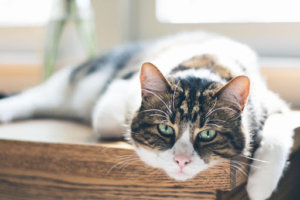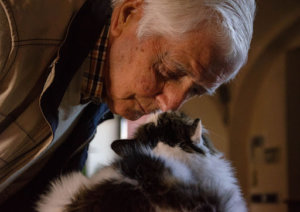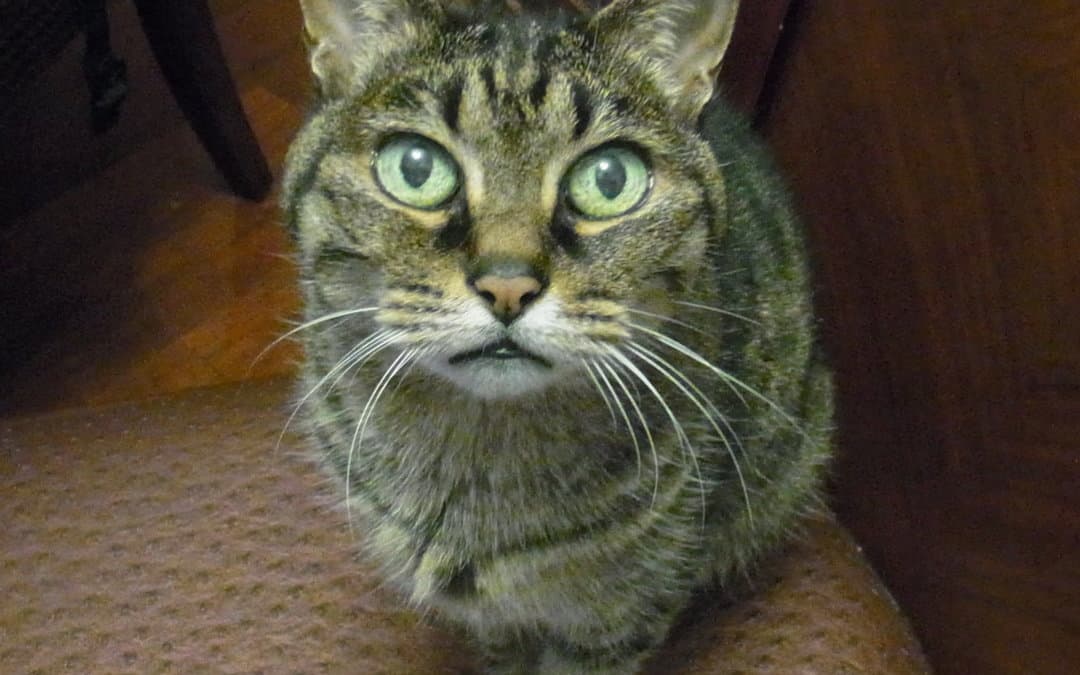This article was sent to us by Elsa Smith. It has information I could have used when we were caring for MITwo, who lived to be 21. Elsa is a freelance journalist and blogger with a love for those with four legs! She has grown up around animals and pets and wants to use her knowledge on pet behavior, training and lifestyle tips to help other pet parents live the best possible life with their furry friend.
Better home care, improved diets and veterinary advances mean that cats are now living longer than ever. In the mid-90s, the average domestic cat lived to around 9 years. Today, it’s not uncommon for our feline friends to reach their late teens!
You may notice changes in your cat’s behaviour as it enters its twilight years. If this is the case, your cat may be suffering from feline cognitive dysfunction (FCD). FCD is a term that has emerged in recent years as new research has helped us to better understand ageing in cats. Essentially, it’s a form of feline dementia.
As an owner, it’s your responsibility to be attentive to any changes so that you can provide adequate care. FCD may throw up new challenges, but it also can tighten the bond between you and your cat!
Below, we explore this condition and reveal what owners can do to help.

Photo by Nathan Fertig on Unsplash
Symptoms & diagnosis of FCD in cats
According to one study, the prevalence of FCD in cats aged 11 to 21 years is around 36%. Whilst just 28% of cats aged 11 to 14 years exhibited behavioural changes, this figure was 50% for cats aged 15 years or older.
As your cat reaches seniority, cognitive changes are likely. Here are the main symptoms of FCD to look out for:
- Altered social interaction
- Increased vocalisation
- Changes in sleep cycles
- Disorientation
- House soiling
- Anxiety
- Changes in activity
If you are concerned about any of these behaviours in your cat, consult a veterinarian for diagnosis. Any ruling on FCD is a ‘diagnosis of exclusion’. Other physical ailments may cause the related symptoms, and a veterinarian must first rule all of these out before diagnosing FCD.
What can you do to help?
While there is no cure for FCD, there are many small steps an owner can take to make their elderly cat’s life easier and more enjoyable. Let’s take a look at what you can do to help.
Mental and physical activity
You may notice that your once-energetic and playful feline is now prone to long periods of inactivity. Rather than letting your cat laze around all day, try to engage them in mental or physical stimulation.
Experiment with new games. Bigger toys that your cat can kick or chase are usually popular. Try playing with a laser light to help your senior feline rediscover its predatory instincts! If these prove too taxing, simply walking around the home with your cat is better than nothing.
Arguably more important for cats with FCD is cognitive engagement. Hide and seek games are a great way to get your cat’s brain working whilst spending quality time together. Puzzle feeders also help to provide mental enrichment.
Your senior cat’s appetite for play won’t be what it once was, so start small and slowly build up more activity time each day.
Orderly environment
One effect of FCD is weakened perception and memory. Your cat may seem lost in a familiar place. By making the environment more accommodating, you can limit a lot of the stresses that your elderly cat may face.
Research suggests that cats with FCD need a predictable living space where all amenities are easily accessible and close to each other. Food and water bowls should sit slightly above ground level to reduce strain from reaching. If soiling is an issue, place a litter tray nearby so all the cat’s key resources are in one place.
Other environmental considerations consist of reducing overstimulation. For example, keep your cat away from loud noises. Also, allocate a cosy, protected space where your cat can spend its private time away from disturbances.
By being mindful of your cat’s needs and creating an environment catered to them, you can keep pain points to a minimum and help your cat feel more like their old, confident self!
Healthy diet
Your cat’s diet is crucial not only to physical health but also to mental performance. According to Purina, a diet containing fish oil, antioxidants, B vitamins and arginine can help felines combat cognitive decline.
Providing your senior cat with nutrient-rich, easily digestible foods can help them become more mentally agile and responsive to learning.

Photo by Pietro Schellino on Unsplash
Veterinary advice
Regular veterinary check-ups on your cat are recommended. Your vet will be able to identify any new changes in your cat and advise care accordingly.
This could include incorporating special food or supplements into your cat’s diet. In some cases, vets may also prescribe medicine specifically targeted to FCD. However, most drug treatments are still in the testing phase and are yet to be rolled out to the masses.
Final thoughts
By encouraging activity, optimising the environment and enhancing diet, you can provide your cat with a quality life well into its senior years.
FCD can’t be cured, but it can be managed with a sense of routine and lots of affection. Believe us: the rewards for the carer are limitless!

